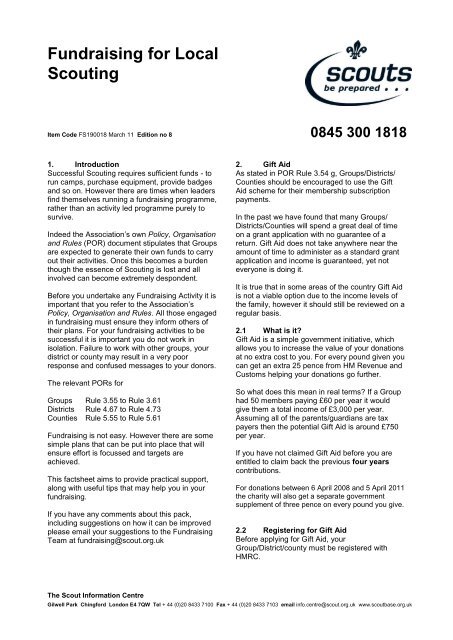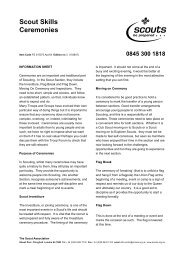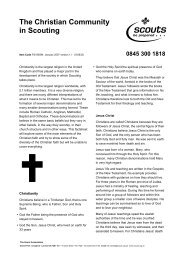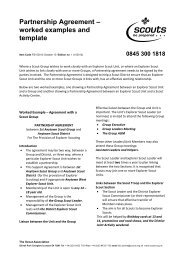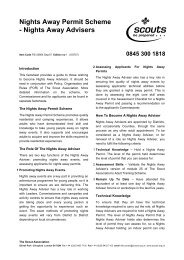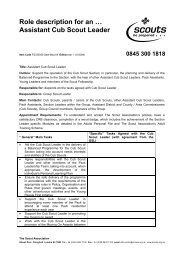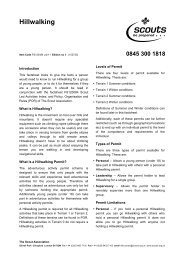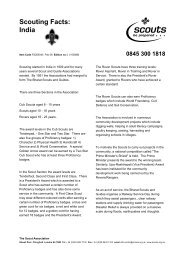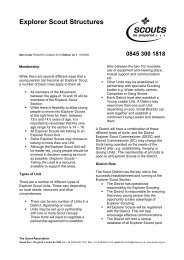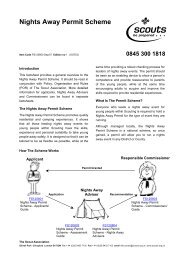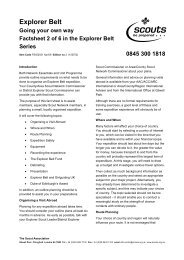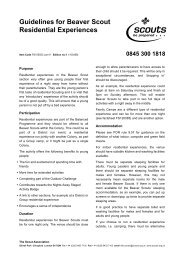Fundraising for Local Scouting - ScoutBase UK
Fundraising for Local Scouting - ScoutBase UK
Fundraising for Local Scouting - ScoutBase UK
Create successful ePaper yourself
Turn your PDF publications into a flip-book with our unique Google optimized e-Paper software.
<strong>Fundraising</strong> <strong>for</strong> <strong>Local</strong><strong>Scouting</strong>Item Code FS190018 March 11 Edition no 8 0845 300 18181. IntroductionSuccessful <strong>Scouting</strong> requires sufficient funds - torun camps, purchase equipment, provide badgesand so on. However there are times when leadersfind themselves running a fundraising programme,rather than an activity led programme purely tosurvive.Indeed the Association’s own Policy, Organisationand Rules (POR) document stipulates that Groupsare expected to generate their own funds to carryout their activities. Once this becomes a burdenthough the essence of <strong>Scouting</strong> is lost and allinvolved can become extremely despondent.Be<strong>for</strong>e you undertake any <strong>Fundraising</strong> Activity it isimportant that you refer to the Association’sPolicy, Organisation and Rules. All those engagedin fundraising must ensure they in<strong>for</strong>m others oftheir plans. For your fundraising activities to besuccessful it is important you do not work inisolation. Failure to work with other groups, yourdistrict or county may result in a very poorresponse and confused messages to your donors.The relevant PORs <strong>for</strong>Groups Rule 3.55 to Rule 3.61Districts Rule 4.67 to Rule 4.73Counties Rule 5.55 to Rule 5.61<strong>Fundraising</strong> is not easy. However there are somesimple plans that can be put into place that willensure ef<strong>for</strong>t is focussed and targets areachieved.This factsheet aims to provide practical support,along with useful tips that may help you in yourfundraising.If you have any comments about this pack,including suggestions on how it can be improvedplease email your suggestions to the <strong>Fundraising</strong>Team at fundraising@scout.org.uk2. Gift AidAs stated in POR Rule 3.54 g, Groups/Districts/Counties should be encouraged to use the GiftAid scheme <strong>for</strong> their membership subscriptionpayments.In the past we have found that many Groups/Districts/Counties will spend a great deal of timeon a grant application with no guarantee of areturn. Gift Aid does not take anywhere near theamount of time to administer as a standard grantapplication and income is guaranteed, yet noteveryone is doing it.It is true that in some areas of the country Gift Aidis not a viable option due to the income levels ofthe family, however it should still be reviewed on aregular basis.2.1 What is it?Gift Aid is a simple government initiative, whichallows you to increase the value of your donationsat no extra cost to you. For every pound given youcan get an extra 25 pence from HM Revenue andCustoms helping your donations go further.So what does this mean in real terms? If a Grouphad 50 members paying £60 per year it wouldgive them a total income of £3,000 per year.Assuming all of the parents/guardians are taxpayers then the potential Gift Aid is around £750per year.If you have not claimed Gift Aid be<strong>for</strong>e you areentitled to claim back the previous four yearscontributions.For donations between 6 April 2008 and 5 April 2011the charity will also get a separate governmentsupplement of three pence on every pound you give.2.2 Registering <strong>for</strong> Gift AidBe<strong>for</strong>e applying <strong>for</strong> Gift Aid, yourGroup/District/county must be registered withHMRC.The Scout In<strong>for</strong>mation CentreGilwell Park Ching<strong>for</strong>d London E4 7QW Tel + 44 (0)20 8433 7100 Fax + 44 (0)20 8433 7103 email info.centre@scout.org.uk www.scoutbase.org.uk
page 4 of 13Existing Supporters – Do you have any?It is far easier to build on a base of existingsupporters than to start from scratch. An existingdonor is ten times more likely to support you againthan someone who has never given.Write a list of all the people you know. What dothey do? Where do they work? Are they currentlysupporting you? Have you ever asked them?What sort of records do you keep? Does anyoneknow if they have supported in the past?Supporters get supportersYou could ask existing supporters to help byrecruiting a friend, a colleague or a familymember.5. Support from local businesses5.1 Who are they?Raising support and income from local business isoften a new and untried task <strong>for</strong> voluntaryorganisations or community groups. However,many small groups do have good relationshipswith individual local business. You will be aware ofthe employers of those involved in your voluntaryorganisation or community group. The personalcontact you have with them will make these theeasiest to approach. You will know the businessesin your area. Note phone numbers and phonethem to find out who it is you will want to meetwith.Also think about:• Rotary, Lions, Round Table and similargroups• Women’s groups – Townswomen’s Guild,Housewife’s Register, WI• Trades Unions and Trades Clubs• Student Union• Religious bodies• Works’ Social Clubs• Pubs and clubs5.2 Who can apply?Many local businesses like to help the communitywhere they operate. Businesses often helpaccording to the personal inclination of managersand owners. Anyone can ask. There are no rules.5.3 What do they fund?Most local businesses have no <strong>for</strong>mal policy andwill help according to the merit of the cause andthe personal relationship with those asking <strong>for</strong>help. They may be able to be flexible in theirgiving and be very generous.5.4 How do you apply?Make a personal approach. In order of preference:Make an appointment to see someone inperson.Have a telephone conversation.Write a personalised letter.Send a general email.5.5 How much?<strong>Local</strong> businesses will vary considering in theamount they can af<strong>for</strong>d to give. They may bemore inclined to help in non monetary ways. Theymight give goods and services. They mightencourage staff to help, using professional skills.They might allow you to use their equipment e.g.use of minibus or van, photocopier, or premises<strong>for</strong> an event.Be appropriate in what you ask <strong>for</strong>. Asking <strong>for</strong> toomuch shows a lack of understanding of theirbusiness. Asking <strong>for</strong> too little means you have toask more businesses.5.6 Further in<strong>for</strong>mationTo find out what businesses operate in your areayou can refer to Thompsons and Yellow Pages.Better still is to find out who are members of thelocal philanthropic organisations such as theRotary Club or Lions.See websites: www.rotaryclubs.co.uk andwww.lions.org.uk. Your chamber of Commercewill publish a directory of members with contactdetails and should be able to give you advise. SeeWebsite: www.chamberonline.co.uk. Use thesewebsites to find local branches.6. Support from high street storesStores often support community projects throughgiving cash, services or goods, allowingcollections in store, encouraging staff support. Ifyou cannot find in<strong>for</strong>mation, ask at your localstore. The manager is often the best first contact.6.1 Who can apply?This varies. Some stores have organised andstructured application procedures however mostare less <strong>for</strong>mal. Most like to fund things of localinterest. If in doubt ask at your local store. Somesupport chosen national charities. In<strong>for</strong>mation ontheir policy is usually found on websites undercorporate/company in<strong>for</strong>mation or communitypages.6.2 What do they fund?Many stores don't have published donationpolicies. Mostly they cover a wide range of good
page 6 of 13There are lots of ways of raising money in yourlocal community to support your project. Here aresome tired and tested ways of raising money.Tick all of those ideas you think might be worthconsidering furthering, or add some of your own.AArt <strong>for</strong> saleAbseiling down the side of tall buildingsAuction of dreamsMNOLiving statuesMarathons and half marathonsMile of penniesNewspaper recyclingOpen daysBCDEFGHBarbequesBingoBarn danceBring & buyCarwashingCarol singingChristmas postConcertDress down FridayDiscosElvis look-a-like competitionFireworks partyFeteFancy dress competitionGo green dayGraffiti clean upHouse to house collectionsHalloween partyPQRSTUVWXParachute jumpsPicnic in the parkPennies in a jarQuiz nightRafflesRecipe bookSponsored walksSupermarket bag packingTombolasTreasure huntUmbrella design competitionVisits and tripsWashing windscreensXmas cardsIIndoor marketIdea competitionsYYear planners and calendarsYo-yo competitionJJumble saleZZany dress dayKLKaraoke eveningsLucky dipsIf you have a great fundraising idea which isn’t onhere why don’t you email the <strong>Fundraising</strong> Team atfundraising@scout.org.uk we can add your idea to
page 7 of 13this list to help make fundraising <strong>for</strong> <strong>Scouting</strong> evenmore successful.8. Collecting donations the easy way8.1 On-line givingYou may wish to ask your supporters to sign upusing an online resource. This is a quick and easyway to collect your donations, along with theadded advantage of being able to use others’networks to send your request further and widerthan ever be<strong>for</strong>e.Two of the most popular sites to use are VirginMoney www.virginmoneygiving.com/giving andJustgiving www.justgiving.com Both provide greatguides to help you enhance your fundraising.Supporters or members of your Group, District orCounty must ensure they choose your charity(Group) to raise money <strong>for</strong>. If your Group is notregistered online your supporters or members willnot be able to find you or send you donations.The Scout Association is moving its online givingto Virgin Money Giving. A new, enhanced onlinegiving system will there<strong>for</strong>e replace the currentsystem with Justgiving.Virgin Money will enable us to offer a moreimproved online giving system to the Movementwhich may include the provision to collectmembership subscriptions, camp fees and therelevant Gift Aid, while being able to collect bothone off and regular donations.To use the Virgin money site you first need toregister your Group/District or County as thecharity, and the payments will then go directly toyour Group bank account.In order to create a smooth transition from onescheme to the next from 4 April 2011 we will nolonger accept Scout Group pages on the currentThe Scout Association Justgiving page.Those who are currently registered with TheScout Association justgiving pages shouldcontinue as be<strong>for</strong>e.This move will not affect their current fundraisingactivity.Details of the new scheme will be available assoon as it is complete.9. <strong>Local</strong> trusts and foundationsTrusts and Foundations work is potentially highlyprofitable. However, if your research is off-themarkit can be very time-consuming andcompletely pointless. Many are tempted toapproach large national organisations, but acampsite is more likely to receive money from alocal trust and foundation i.e. one that specialisesin the immediate geographical area.9.1 Understanding how trusts workThere are various key factors that influence howeach trust operates, and you need to develop anunderstanding of these in order to increase yourchances of success.9.2 Where trusts get there money fromMost trusts are established with a capital sumprovided by a founder during his or her lifetime orin their will. This could be cash, shares in acompany or even land. The founder could be asuccessful business person – such as PaulHamlyn or David Sainsbury, who have both set upmajor foundations – but there are also many trustsset up by individuals with much more modestsums.Some trusts are set up with donations from thepublic. The various Royal Jubilee Trusts areexamples, as are the Winston Churchill MemorialTrust and the Diana, Princess of Wales MemorialFund, both of which were set up in memory offamous individuals.Some trusts have no permanent funds, but rely oncontinuing fundraising to provide them with money<strong>for</strong> distribution. The largest of these are the BBC’sChildren in Need and Comic Relief, both of whichraise money through major television appeals.Some trusts are set up by companies as a vehicle<strong>for</strong> their charitable giving. Depending on the waythis is done, some are truly independent, whilstothers are obliged to follow company policy intheir grantmaking.How a trust is founded can have a significantimpact on its grantmaking. Although the trust’sdeclared area of interest may simply be recordedas ‘General charitable purposes, the founder’swishes, sometimes set out in a letter attached tothe founding trust deed, will guide trustees in theirgrantmaking. The founder and his or her familymay often play a leading role in the affairs of thetrust as trustees, supporting concerns andprojects which particularly interest them. This isperfectly legitimate; trusts are in one sense‘private bodies’ set up <strong>for</strong> ‘public benefit’. They arenot, however, private in the sense of beingpermitted to keep in<strong>for</strong>mation about their assetsand grantgiving to themselves. Like other
page 8 of 13charities, all charitable trusts in England andWales must be registered with the CharityCommission and file their annual accountsaccording to the requirements of the Statement ofRecommended Practice (SORP). Over time, thefounder’s influence can diminish as outsidetrustees are appointed, which has happened withthe Joseph Rowntree and Nuffield Foundations.9.3 The trust’s object and policiesThe trust deed, governing or founding document,sets out the objects or purposes of the trust,defining what can and cannot be supported.Objects can be very broad, defined only asgeneral charitable or educational purposes, orquite specific; one of the objects of the ChildwickTrust, <strong>for</strong> example is to support charities <strong>for</strong>people who work or have worked in the miningindustry in South Africa; and the Great BritainSasakawa Foundation exists to support linksbetween Great Britain and Japan.The trustees can also decide on a policy andpriorities <strong>for</strong> their grantmaking (so long as this fallswithin the objects of the trust). So a trust set up <strong>for</strong>the advancement of education might decide togive all its money <strong>for</strong> literacy and numeracy, or asbursaries to young people aged 16 to 18 in orderto encourage them to stay on at school, or toprimary schools to buy computers. You need tocheck to see whether your application falls withinthe trust’s current grant policy and priorities. It isalso worth looking at what grants it has given inthe recent past, since this may help you to identifythe trustee’s preferences – although these canchange from year to year; and just because a trustgave to a particular type of project one year, itmay not intend supporting similar schemes thenext year. It is also possible to misinterpret why aparticular grant was given; funding <strong>for</strong> a churchchoir may have been because the trust supportsmusic, or it may simply support church-relatedactivities, in which case there is little point inapplying <strong>for</strong> money <strong>for</strong> a school music project. Notall areas of charitable work are equally supported;trusts determine their own priorities <strong>for</strong> giving,which may not relate to current needs or issues insociety.9.4 The beneficial areaMany trusts are restricted in where they can givesupport. Some can give throughout the <strong>UK</strong>, oreven throughout the world. Many can only givelocally.9.5 Finding trusts and foundationsThere are numerous sources of in<strong>for</strong>mation withdetails of trusts and foundations. <strong>Local</strong>ly the bestsource of in<strong>for</strong>mation will be your local communityfoundation.9.6 Community foundationsCommunity foundations work in a specificgeographical area to provide grants <strong>for</strong> localcharitable activity. They have been active in the<strong>UK</strong> since the 1980s, although the idea originatedin America in 1914. Community Foundationsoperate in two main ways:By building an endowment of capital given tothem by companies, trusts and individuals intheir area, and from legacies. The incomefrom this is then used to make grants.They work with other donors to help themdistribute their money more effectively.Donors can direct their funds to a favouredcause or within a specified geographical area.Themed funds can address a particular issue,such as crime prevention, and projects can besupported with donations from severalsources.Community foundations are being promoted,supported and trained by the CommunityFoundation Network. This is how they describetheir role:‘Community Foundation Network (CFN) aims topromote the concept of community foundations inthe <strong>UK</strong>, stimulate and support their growth andbest practice, and give support to individualcommunity foundations and their networking withothers.CFN’s objective is to ensure a network of thrivingcommunity foundations throughout the <strong>UK</strong>, eachone able to strengthen their local communitythrough strategic grantmaking and excellentservice provision to donors.Community trusts are growing in importance, andat an impressive rate. In 1999 – 2000 there were29 fully operational community foundations. In2007 CFN claims a membership of approximately60, which <strong>for</strong> the year 2005-06 gave out grantstotalling £70million. They can be key funders oflocal work, and may also give advice on raisingmoney to obtain further funding; a national trust islikely to react more positively to your application ifyou can demonstrate that you have alreadysuccessfully raised money locally.Details of your local community foundation can befound at:
page 9 of 13www.communityfoundations.org.ukDirectory of Social Change books can be found inyour local library and are a great source oflocalised funding.http://www.dsc.org.uk/HomeThey also have a great website, but bewarebe<strong>for</strong>e you start spending money onsubscriptions. Ask yourself ‘Who else has accessto this? Can they run a search <strong>for</strong> me? If youdesperately want to keep control of it yourself askyourself how often you are going to use it. Is itcost effective to spend £250.00 on a subscription<strong>for</strong> a small one off fundraising campaign?The NCVO has recently launched a free accessdatabase site of over 4,000 sources of funding.This is available athttp://www.fundingcentral.org.uk/default.aspxGuidestar:http://www.guidestar.org.uk/ and theCharity Commission:http://www.charity-commission.gov.uk/can also be a great source of in<strong>for</strong>mation.Please note: As with all Trusts and Foundationsfundraising remember your major competitorwhen writing and asking <strong>for</strong> support are otherScout Groups/Districts and Counties. Be<strong>for</strong>e youmake any approaches make sure you havefollowed P.O.R. If you have the County shouldhave a database of approaches and outcomeswhich will assist with your targeted applications.Good Luck !!!!!!Websites such as:
<strong>Fundraising</strong> <strong>for</strong> <strong>Local</strong><strong>Scouting</strong>Item Code FS190018 March 11 Edition no 8 0845 300 1818The Scout In<strong>for</strong>mation CentreGilwell Park Ching<strong>for</strong>d London E4 7QW Tel + 44 (0)20 8433 7100 Fax + 44 (0)20 8433 7103 email info.centre@scout.org.uk www.scoutbase.org.uk
page 11 of 13
page 12 of 13
page 13 of 13


